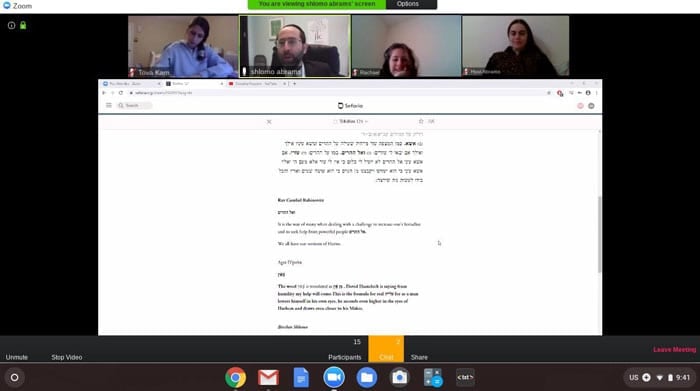Focus on Mesorah High School for Girls: A Novel Experience of Learning
Mesorah High School for Girls Enters Online Learning in the Age of Coronavirus.
By: Leora Schramm (10th grade at Mesorah)
Making the Transition
As COVID-19 causes panic throughout the whole world, all schools and nonessential workplaces have shut down. Everyone is doing things online, whether it’s work, school, or even socializing. For a high school student, taking classes online can be very difficult. There are no more in-person interactions and there are many aspects like the internet that are out of one’s control. Mesorah High School for Girls is an all girls Orthodox high school in Dallas, Texas, that had to switch to online classes because of coronavirus. On March 16, everyone in school left the building and shifted into a new reality.
Before there was concern about closing school and going virtual, Mesorah started to buy Chromebooks for all the students. The administration believed that it would be helpful for the students to have a school computer to take notes, write papers, and do online classes. This was complete Hashgacha Pratis (Divine providence) because only three weeks after all the students were handed their Chromebooks, the school had to close and go online. The fact that everyone had a Chromebook made the transition so much easier.


All the classes are set up through Google classroom and each student has a school email that the teachers and administration can send information to. There are scheduled Zoom classes and assignments assigned via Google classroom. There have been many schedule changes by the administration to ensure all the students’ needs and concerns have been addressed.
Definitely Not “One Size Fits All” Approach to Learning
For a student in her sophomore year, the school day starts with a mandatory Zoom attendance at 9:00a.m. There, the headmaster Rabbi Avraham Zev Kosowsky or assistant principal Mrs. Susan Rich will make announcements that might concern the day. Often we hear a word of inspiration or say a chapter of Tehillim (psalms) for those suffering with the virus. At 9:15, all students start their first class. Depending on the day and which classes students are in, the first couple of classes will be Chumash, Halacha, or Tehillim. After those classes, Jewish History and chemistry follow. At 11:15 all the students have a lunch break and classes resume at 12:30. During this time students are able to eat lunch, talk to friends, or finish work.
In the afternoon students have English and math. Many students take online classes through a dual curriculum program at Richland College. Some take math, economics, finance, or a foreign language like Japanese. There are set times at the end of the day where teachers for Navi bekius, Chumash bekius, and Jewish History give quizzes for students in their classes. On Thursday at 4:30, a school committee will have an activity. The G.O (Girls Organization) committee has set up a couple of activities like a Kahoot game for students to play online. Before Pesach the Yom Iyun heads contacted Torah Girls Academy, a girls high school in Houston, Texas, to set up a Pesach Yom Iyun together. Both the TGA girls and Mesorah girls listened to Rabbi Israel Lashak and Rabbi Shalom Meltzer give a speech. In between the two speeches, both schools played a game together.
The first week of school online was rough. Many students were confused and unfamiliar with this new style of learning and called the administration to voice their concerns. Students were worried about the expectations for this new way of learning. In the first week of school, some teachers sent out pre-recorded classes, and many students found it hard to sit through a bunch of recordings. Also, some students had tests coming up and wondered how they could take a test online and at home when they were so used to taking it at school in a classroom setting. The administration was able to listen to all of the students’ concerns and help ease any student who was finding the online classes difficult. Now only one or two classes are pre-recorded while most are online through Zoom and students are adjusting well to this new type of learning.
Helping Students
“I’m amazed at how the administration handled everyone’s reactions. If I were in charge of running a high school and forced online, I would crumble under the pressure. I have found respect for all the people who run schools at this time,” a sophomore said.
With this new way of teaching, there are still factors that even teachers find difficult. Mrs. Jihong Xu and Miss Erin Engmann, both science teachers, expressed the difficulty of not being able to interact with students face to face or one on one. However, this is a learning period for students and teachers alike.
Mrs. Esti Abrams, who teaches Chumash, Jewish History, and Navi bekius, said, “Learning is all about gaining more knowledge, more skills and applying it to life. I’ve definitely learned so many new technology skills! And I’m really proud of how willing and eager the Mesorah girls are in adjusting to this new way of learning. It’s a unified effort to make “class” work and continue learning in as much of a normal way possible, and they all seem so positive and eager about making that happen!”
Helping Teachers
Teachers are also helping and supporting each other. If one has a question they may add another teacher on to their virtual classrooms to help. Teacher meetings have been held so the administration can check up on the teachers and make sure that classes can run as smoothly as possible. The teachers and administrators constantly help, support, and encourage each other and despite being stuck at home there is still a feeling of comradery in the air.
Students are also gaining new skills. In the first week of online classes, it was difficult to manage time. Many students felt overwhelmed because there weren’t many set classes or normal school periods to structure their day. But after talking with the teachers and administrators students learned how to manage their time better and prioritize their work. Sima Alhadaff, who teaches Chumash, Pirkei Avot, math and engineering, described it as a team. Students give feedback to the teachers and administration and then the teachers and administration use that feedback to try to further improve the classes.
“The school’s teachers and administration are always there for the students. They always answer very quickly to any issues that come up and always try to help whenever they can,” a junior said.
Zooming to the Top
“I’m proud of my students who have made huge adjustments to their daily lives for their education. I’m thankful that so many parents are very supportive. I’m so grateful that Mesorah provides tremendous support and flexibility to both teachers and students. It’s amazing that we can do school this way together at Mesorah.” from Mrs. Xu.
As we get through this pandemic, education is valuable and important. “Teaching online isn’t ideal, but learning is still intellectually stimulating, and interaction is still emotionally satisfying.” Mrs. Zara Westbrook, Mesorah’s English teacher said. Though school online is new and foreign to many, mistakes and feedback are all part of this current process. There are many factors that go into a functional school and it’s important to remember that communication is key. Mesorah is doing a great job of focusing on learning but still taking into account the teachers and students.



